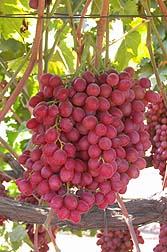This page has been archived and is being provided for reference purposes only. The page is no longer being updated, and therefore, links on the page may be invalid.
|
|
Sweet Scarlet Grape: New Variety Readied for GrowersBy Marcia WoodMarch 15, 2004 A sweet, colorful red seedless grape called "Sweet Scarlet" has a surprise inside: The crisp flesh of this new grape has a light, pleasant, muscat flavor, an unusual treat that gives this grape a different taste than most red seedless varieties. Developed by the Agricultural Research Service (ARS), the new grape also has another distinctive feature: its attractive, raspberry-red skin is a brighter color than that of other midseason, fresh red grapes. Ready to harvest in late August, Sweet Scarlet resulted from more than a decade of grape breeding and testing by ARS horticulturist David W. Ramming and technician Ronald E. Tarailo. The grape joins a series of top-quality red, white and black seedless grapes developed by this expert team. Ramming and Tarailo are with the Postharvest Quality and Genetics Research Unit, located in central California at the ARS San Joaquin Valley Agricultural Sciences Center in Parlier. Sweet Scarlet grapes could start showing up in supermarkets within three to four years, according to Ramming. Sweet Scarlet is the offspring of two ARS-developed parent seedless grapes. Though developed and tested in California, where most of the nation's fresh grapes are grown, Sweet Scarlet may also be suitable for planting in other locations where Vitis vinifera grapes can be grown. Most grapes produced commercially in the United States are varieties of V. vinifera. The California Table Grape Commission in Fresno, Calif., is the exclusive licensee for Sweet Scarlet, handling its distribution to nurseries. The average American eats about seven to eight pounds of fresh grapes in a year. Fresh grapes are a good source of phytonutrients, healthful compounds that may protect against cancer and heart disease. Also, fresh grapes provide potassium, vitamin C, vitamin B6 and thiamin. ARS is the U.S. Department of Agriculture's chief scientific research agency. |

